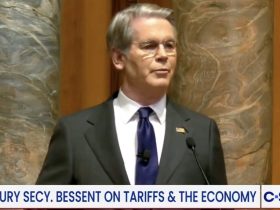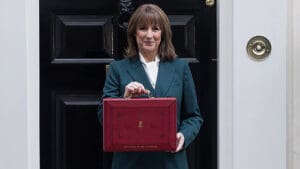High street banks have begun hiking mortgage rates for borrowers with large deposits, in a move that could add hundreds of pounds a year to the cost of remortgaging for wealthier homeowners.
The shift comes as stubborn inflation figures dampen hopes of further interest rate cuts this summer.
Over the past week, nine lenders — including Halifax, Nationwide, NatWest and Santander — have increased their fixed-rate mortgage deals, targeting products typically used by those with at least 40 per cent equity. The rate rises follow a surprise jump in inflation in April, when the consumer price index climbed to 3.5 per cent, up from 2.6 per cent in March.
The unexpected uptick in inflation has unnerved the mortgage market, prompting a swift rethink on how quickly the Bank of England might cut interest rates. As a result, lenders have moved to reprice products that had recently become cheaper amid earlier forecasts of multiple rate cuts this year.
Nationwide raised its two-year fixed deal for remortgagers with a minimum 40 per cent deposit from 3.84 per cent to 4.04 per cent — a change that would cost an extra £336 per year on a £200,000 mortgage over 25 years. Its five-year fixed rate on the same terms has risen from 3.84 per cent to 4.09 per cent. NatWest also raised its remortgage rates for high-equity borrowers, pushing its two-year fix up to 3.94 per cent.
So far, the increases have mostly hit wealthier homeowners — those looking to remortgage or buy with a large deposit — while first-time buyers or those with smaller deposits have seen little change.
“This part of the market has always been the most competitive and attractive for lenders, so rates tend to be lower and profit margins can be tight,” said Mark Harris, chief executive of mortgage broker SPF Private Clients. “Any increase in funding costs could make these deals unprofitable, which may explain why lenders are targeting this segment for rate rises.”
The Bank of England earlier this month trimmed the base rate from 4.5 to 4.25 per cent, raising expectations of more cuts this year. But with inflation proving stickier than expected, and the economy growing faster than forecast, the outlook for further cuts is less certain.
Economists at major investment banks such as Barclays and Morgan Stanley have now scaled back their predictions, expecting just one or two more cuts in 2025 — far fewer than previously anticipated.
Borrowers are being advised to act quickly to secure low rates while they remain. The cheapest two-year fixed deal for buyers is currently 3.86 per cent from HSBC, with a £999 fee, while the same bank offers a 3.84 per cent rate for remortgagers.
“Many lenders who had been cutting their rates aggressively to win business have been forced to rapidly rethink their loan pricing,” said Peter Stimson of MPowered Mortgages. “Some of the very low rates that appeared at the start of May are already disappearing.”
Fixed-rate deals can typically be locked in up to six months ahead of completion, allowing buyers or those refinancing to hedge against further rises. If rates fall, borrowers can often switch to a lower deal closer to completion.
“If you are looking to purchase or refinance any time soon, secure the best rate now,” Harris said. “If rates go up, you’ve protected yourself. If they fall, you can often move to a better deal. It’s a win-win.”
Read more:
Wealthier homeowners hit as banks raise mortgage rates amid inflation fears











